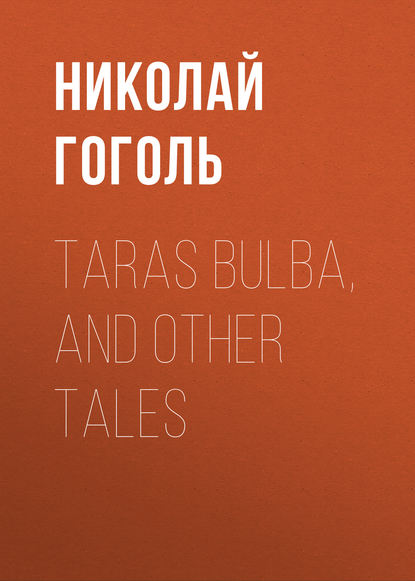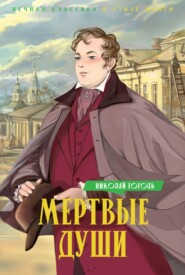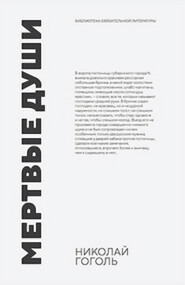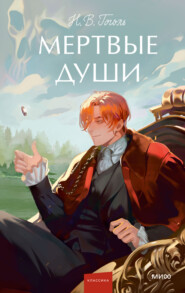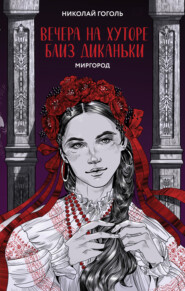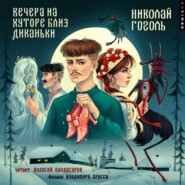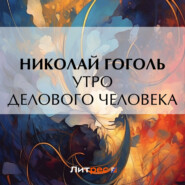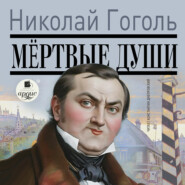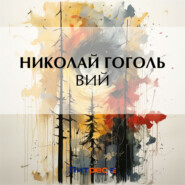По всем вопросам обращайтесь на: info@litportal.ru
(©) 2003-2025.
✖
Taras Bulba, and Other Tales
Год написания книги
2018
Настройки чтения
Размер шрифта
Высота строк
Поля
At this moment lunch was brought in.
Ivan Ivanovitch drank a glass and ate a pie with sour cream. “Listen, Ivan Nikiforovitch: I will give you, besides the sow, two sacks of oats. You did not sow any oats. You’ll have to buy some this year in any case.”
“By Heaven, Ivan Ivanovitch, I must tell you you are very foolish! Who ever heard of swapping a gun for two sacks of oats? Never fear, you don’t offer your coat.”
“But you forget, Ivan Nikiforovitch, that I am to give you the sow too.”
“What! two sacks of oats and a sow for a gun?”
“Why, is it too little?”
“For a gun?”
“Of course, for a gun.”
“Two sacks for a gun?”
“Two sacks, not empty, but filled with oats; and you’ve forgotten the sow.”
“Kiss your sow; and if you don’t like that, then go to the Evil One!”
“Oh, get angry now, do! See here; they’ll stick your tongue full of red-hot needles in the other world for such godless words. After a conversation with you, one has to wash one’s face and hands and fumigate one’s self.”
“Excuse me, Ivan Ivanovitch; my gun is a choice thing, a most curious thing; and besides, it is a very agreeable decoration in a room.”
“You go on like a fool about that gun of yours, Ivan Nikiforovitch,” said Ivan Ivanovitch with vexation; for he was beginning to be really angry.
“And you, Ivan Ivanovitch, are a regular goose!”
If Ivan Nikiforovitch had not uttered that word they would not have quarrelled, but would have parted friends as usual; but now things took quite another turn. Ivan Ivanovitch flew into a rage.
“What was that you said, Ivan Nikiforovitch?” he said, raising his voice.
“I said you were like a goose, Ivan Ivanovitch!”
“How dare you, sir, forgetful of decency and the respect due to a man’s rank and family, insult him with such a disgraceful name!”
“What is there disgraceful about it? And why are you flourishing your hands so, Ivan Ivanovitch?”
“How dared you, I repeat, in disregard of all decency, call me a goose?”
“I spit on your head, Ivan Ivanovitch! What are you screeching about?”
Ivan Ivanovitch could no longer control himself. His lips quivered; his mouth lost its usual V shape, and became like the letter O; he glared so that he was terrible to look at. This very rarely happened with Ivan Ivanovitch: it was necessary that he should be extremely angry at first.
“Then, I declare to you,” exclaimed Ivan Ivanovitch, “that I will no longer know you!”
“A great pity! By Heaven, I shall never weep on that account!” retorted Ivan Nikiforovitch. He lied, by Heaven, he lied! for it was very annoying to him.
“I will never put my foot inside your house gain!”
“Oho, ho!” said Ivan Nikiforovitch, vexed, yet not knowing himself what to do, and rising to his feet, contrary to his custom. “Hey, there, woman, boy!” Thereupon there appeared at the door the same fat woman and the small boy, now enveloped in a long and wide coat. “Take Ivan Ivanovitch by the arms and lead him to the door!”
“What! a nobleman?” shouted Ivan Ivanovitch with a feeling of vexation and dignity. “Just do it if you dare! Come on! I’ll annihilate you and your stupid master. The crows won’t be able to find your bones.” Ivan Ivanovitch spoke with uncommon force when his spirit was up.
The group presented a striking picture: Ivan Nikiforovitch standing in the middle of the room; the woman with her mouth wide open and a senseless, terrified look on her face, and Ivan Ivanovitch with uplifted hand, as the Roman tribunes are depicted. This was a magnificent spectacle: and yet there was but one spectator; the boy in the ample coat, who stood quite quietly and picked his nose with his finger.
Finally Ivan Ivanovitch took his hat. “You have behaved well, Ivan Nikiforovitch, extremely well! I shall remember it.”
“Go, Ivan Ivanovitch, go! and see that you don’t come in my way: if you do, I’ll beat your ugly face to a jelly, Ivan Ivanovitch!”
“Take that, Ivan Nikiforovitch!” retorted Ivan Ivanovitch, making an insulting gesture and banged the door, which squeaked and flew open again behind him.
Ivan Nikiforovitch appeared at it and wanted to add something more; but Ivan Ivanovitch did not glance back and hastened from the yard.
CHAPTER III
WHAT TOOK PLACE AFTER IVAN IVANOVITCH’S QUARREL WITH IVAN NIKIFOROVITCH
And thus two respectable men, the pride and honour of Mirgorod, had quarrelled, and about what? About a bit of nonsense—a goose. They would not see each other, broke off all connection, though hitherto they had been known as the most inseparable friends. Every day Ivan Ivanovitch and Ivan Nikiforovitch had sent to inquire about each other’s health, and often conversed together from their balconies and said such charming things as did the heart good to listen to. On Sundays, Ivan Ivanovitch, in his lambskin pelisse, and Ivan Nikiforovitch, in his cinnamon-coloured nankeen spencer, used to set out for church almost arm in arm; and if Ivan Ivanovitch, who had remarkably sharp eyes, was the first to catch sight of a puddle or any dirt in the street, which sometimes happened in Mirgorod, he always said to Ivan Nikiforovitch, “Look out! don’t put your foot there, it’s dirty.” Ivan Nikiforovitch, on his side, exhibited the same touching tokens of friendship; and whenever he chanced to be standing, always held out his hand to Ivan Ivanovitch with his snuff-box, saying: “Do me the favour!” And what fine managers both were!—And these two friends!—When I heard of it, it struck me like a flash of lightning. For a long time I would not believe it. Ivan Ivanovitch quarrelling with Ivan Nikiforovitch! Such worthy people! What is to be depended upon, then, in this world?
When Ivan Ivanovitch reached home, he remained for some time in a state of strong excitement. He usually went, first of all, to the stable to see whether his mare was eating her hay; for he had a bay mare with a white star on her forehead, and a very pretty little mare she was too; then to feed the turkeys and the little pigs with his own hand, and then to his room, where he either made wooden dishes, for he could make various vessels of wood very tastefully, quite as well as any turner, or read a book printed by Liubia, Garia, and Popoff (Ivan Ivanovitch could never remember the name, because the serving-maid had long before torn off the top part of the title-page while amusing the children), or rested on the balcony. But now he did not betake himself to any of his ordinary occupations. Instead, on encountering Gapka, he at once began to scold her for loitering about without any occupation, though she was carrying groats to the kitchen; flung a stick at a cock which came upon the balcony for his customary treat; and when the dirty little boy, in his little torn blouse, ran up to him and shouted: “Papa, papa! give me a honey-cake,” he threatened him and stamped at him so fiercely that the frightened child fled, God knows whither.
But at last he bethought himself, and began to busy himself about his every-day duties. He dined late, and it was almost night when he lay down to rest on the balcony. A good beet-soup with pigeons, which Gapka had cooked for him, quite drove from his mind the occurrences of the morning. Again Ivan Ivanovitch began to gaze at his belongings with satisfaction. At length his eye rested on the neighbouring yard; and he said to himself, “I have not been to Ivan Nikiforovitch’s to-day: I’ll go there now.” So saying, Ivan Ivanovitch took his stick and his hat, and directed his steps to the street; but scarcely had he passed through the gate than he recollected the quarrel, spit, and turned back. Almost the same thing happened at Ivan Nikiforovitch’s house. Ivan Ivanovitch saw the woman put her foot on the fence, with the intention of climbing over into his yard, when suddenly Ivan Nikiforovitch’s voice was heard crying: “Come back! it won’t do!” But Ivan Ivanovitch found it very tiresome. It is quite possible that these worthy men would have made their peace next day if a certain occurrence in Ivan Nikiforovitch’s house had not destroyed all hopes and poured oil upon the fire of enmity which was ready to die out.
On the evening of that very day, Agafya Fedosyevna arrived at Ivan Nikiforovitch’s. Agafya Fedosyevna was not Ivan Nikiforovitch’s relative, nor his sister-in-law, nor even his fellow-godparent. There seemed to be no reason why she should come to him, and he was not particularly glad of her company; still, she came, and lived on him for weeks at a time, and even longer. Then she took possession of the keys and took the management of the whole house into her own hands. This was extremely displeasing to Ivan Nikiforovitch; but he, to his amazement, obeyed her like a child; and although he occasionally attempted to dispute, yet Agafya Fedosyevna always got the better of him.
I must confess that I do not understand why things are so arranged, that women should seize us by the nose as deftly as they do the handle of a teapot. Either their hands are so constructed or else our noses are good for nothing else. And notwithstanding the fact that Ivan Nikiforovitch’s nose somewhat resembled a plum, she grasped that nose and led him about after her like a dog. He even, in her presence, involuntarily altered his ordinary manner of life.
Agafya Fedosyevna wore a cap on her head, and a coffee-coloured cloak with yellow flowers and had three warts on her nose. Her figure was like a cask, and it would have been as hard to tell where to look for her waist as for her to see her nose without a mirror. Her feet were small and shaped like two cushions. She talked scandal, ate boiled beet-soup in the morning, and swore extremely; and amidst all these various occupations her countenance never for one instant changed its expression, which phenomenon, as a rule, women alone are capable of displaying.
As soon as she arrived, everything went wrong.
“Ivan Nikiforovitch, don’t you make peace with him, nor ask his forgiveness; he wants to ruin you; that’s the kind of man he is! you don’t know him yet!” That cursed woman whispered and whispered, and managed so that Ivan Nikiforovitch would not even hear Ivan Ivanovitch mentioned.
Everything assumed another aspect. If his neighbour’s dog ran into the yard, it was beaten within an inch of its life; the children, who climbed over the fence, were sent back with howls, their little shirts stripped up, and marks of a switch behind. Even the old woman, when Ivan Ivanovitch ventured to ask her about something, did something so insulting that Ivan Ivanovitch, being an extremely delicate man, only spit, and muttered, “What a nasty woman! even worse than her master!”
Finally, as a climax to all the insults, his hated neighbour built a goose-shed right against his fence at the spot where they usually climbed over, as if with the express intention of redoubling the insult. This shed, so hateful to Ivan Ivanovitch, was constructed with diabolical swiftness—in one day.
This aroused wrath and a desire for revenge in Ivan Ivanovitch. He showed no signs of bitterness, in spite of the fact that the shed encroached on his land; but his heart beat so violently that it was extremely difficult for him to preserve his calm appearance.
He passed the day in this manner. Night came—Oh, if I were a painter, how magnificently I would depict the night’s charms! I would describe how all Mirgorod sleeps; how steadily the myriads of stars gaze down upon it; how the apparent quiet is filled far and near with the barking of dogs; how the love-sick sacristan steals past them, and scales the fence with knightly fearlessness; how the white walls of the houses, bathed in the moonlight, grow whiter still, the overhanging trees darker; how the shadows of the trees fall blacker, the flowers and the silent grass become more fragrant, and the crickets, unharmonious cavaliers of the night, strike up their rattling song in friendly fashion on all sides. I would describe how, in one of the little, low-roofed, clay houses, the black-browed village maid, tossing on her lonely couch, dreams with heaving bosom of some hussar’s spurs and moustache, and how the moonlight smiles upon her cheeks. I would describe how the black shadows of the bats flit along the white road before they alight upon the white chimneys of the cottages.
But it would hardly be within my power to depict Ivan Ivanovitch as he crept out that night, saw in hand; or the various emotions written on his countenance! Quietly, most quietly, he crawled along and climbed upon the goose-shed. Ivan Nikiforovitch’s dogs knew nothing, as yet, of the quarrel between them; and so they permitted him, as an old friend, to enter the shed, which rested upon four oaken posts. Creeping up to the nearest post he applied his saw and began to cut. The noise produced by the saw caused him to glance about him every moment, but the recollection of the insult restored his courage. The first post was sawed through. Ivan Ivanovitch began upon the next. His eyes burned and he saw nothing for terror.
All at once he uttered an exclamation and became petrified with fear. A ghost appeared to him; but he speedily recovered himself on perceiving that it was a goose, thrusting its neck out at him. Ivan Ivanovitch spit with vexation and proceeded with his work. The second post was sawed through; the building trembled. His heart beat so violently when he began on the third, that he had to stop several times. The post was more than half sawed through when the frail building quivered violently.
Ivan Ivanovitch had barely time to spring back when it came down with a crash. Seizing his saw, he ran home in the greatest terror and flung himself upon his bed, without having sufficient courage to peep from the window at the consequences of his terrible deed. It seemed to him as though Ivan Nikiforovitch’s entire household—the old woman, Ivan Nikiforovitch, the boy in the endless coat, all with sticks, and led by Agafya Fedosyevna—were coming to tear down and destroy his house.





